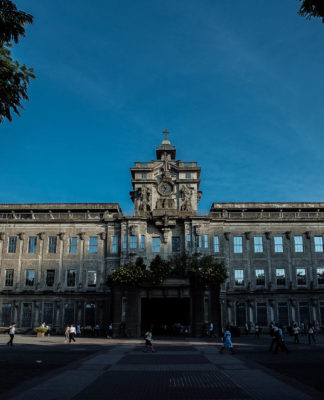CHURCH leaders have called for a prayer rally on Saturday, Aug. 4 at the EDSA Shrine, ahead of a crucial vote on the controversial “reproductive health” (RH) bill at the House of Representatives.
The “Prayer Power Rally against the RH bill” is being organized by different Church and lay organizations from various dioceses, led by the Catholic Bishops’ Conference of the Philippines’ (CBCP) Episcopal Commission on Family and Life (ECFL) and the Archdiocese of Manila.
The rally at the historic EDSA Shrine, site of two peaceful “people power” uprisings, will be held from 1 p.m. to 7 p.m. There will be a Mass at 5 p.m.
The announcement came as Cebu Archbishop Jose Palma, president of the CBCP, issued a statement warning that the RH bill would “curtail” the country’s economic growth.
In the statement dated July 30, Palma argued that economic development depended on a growing workforce. “Our country’s positive birth rate and a population composed of mostly young people are the main players that fuel the economy,” Palma said.
“The draconian population control policy of the Reproductive Health (RH) Bill would only curtail our economic growth. The problem of countries with former robust economies is the lack of young workers for their industries and inadequate support for their aging population,” he added.
President Benigno S. Aquino III endorsed “responsible parenthood” during his state-of-the-nation address last July 23, saying it could solve the classroom shortage. Following the President’s remark, the House of Representatives scheduled a vote on Aug. 7 to end debates over the bill, which seeks billions in public funds for a massive contraception program.
The Catholic Church’s understanding of responsible parenthood is different, however. In Humanae Vitae, Pope Paul VI’s encyclical that confirmed church teaching against contraception, responsible parenthood requires couples to consider the “objective moral order which was established by God, and of which a right conscience is the true interpreter.”
“From this it follows that they are not free to act as they choose in the service of transmitting life, as if it were wholly up to them to decide what is the right course to follow. On the contrary, they are bound to ensure that what they do corresponds to the will of God the Creator. The very nature of marriage and its use makes His will clear, while the constant teaching of the Church spells it out,” the encyclical states.
Palma, in his statement, said it’s “disturbing when the country is told that having too many school children is a burden to the national budget.”
Maternal deaths are a “serious concern” but could be addressed by improving health programs. “Providing proper and adequate maternal care could be done without passing the RH bill, but by strengthening and improving access to existing medical services,” he said.
Antipolo Bishop Gabriel V. Reyes, ECFL chairman, called for the praying of the Angelus every 6 p.m. in the days leading to the House vote.
Reyes said Saturday’s rally won’t be a political gathering. “[T]his is a moral issue and therefore this event will not be a political rally but a prayer rally focused on praying for the non-passage of the [RH bill].”
‘Jarring’
The campaign against the RH bill got a boost with a July 24 editorial in the Wall Street Journal warning that the Philippine economy could be hurt by a government-sponsored birth control program.
The American business publication said population control was not the solution to the Philippines’ economic woes, but policies promoting growth.
“The Philippines doesn’t have too many people, it has too few pro-growth policies,” said the Wall Street Journal piece titled “Keeping the Philippine Dream Alive: Investors see the first hints of pro-growth reform momentum.”
The Journal commended President Aquino for economic gains in the past two years and for pushing reforms, but said “his promotion of a ‘reproductive health’ bill is jarring.”
By tinkering with demographics, the Philippines could go the way of countries like China whose growth is seen as no longer sustainable because of a shrinking productive population, it said.
The RH bill will “put the Philippines in danger of following China’s path into middle-income development followed by a demographic trap of too few workers,” the Journal said.
















